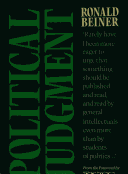Routledge Library Editions: Political Science
1 primary work
Book 20
Originally published in 1983. One of the basic capacities of man as a political being is his faculty of judgement. Yet for all the books on concepts like freedom, equality and authority, surprisingly little attention has been given to this topic in the tradition of Western political thought. What is the nature of political judgement? What endows us, as human beings, with the ability to make reasonable judgements about human affairs and to judge the common world we share with others? By what means to we secure validity for our judgements? What are the underlying conditions of this human capacity, and what implications does it have the understanding of politics? These questions, central as they are to any reflection on politics have rarely been addressed in a systematic way. This book examines Kant's concept of taste and Aristotle's concept of prudence, as well as recent works of political philosophy by Arendt, Gadamer and Habermas, all crucially influenced by Kant and Aristotle.
